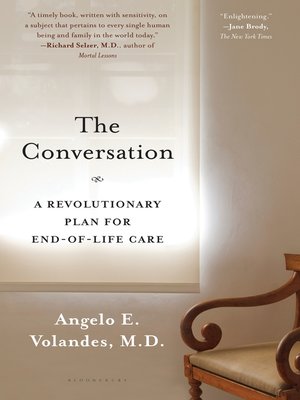
Sign up to save your library
With an OverDrive account, you can save your favorite libraries for at-a-glance information about availability. Find out more about OverDrive accounts.
Find this title in Libby, the library reading app by OverDrive.



Search for a digital library with this title
Title found at these libraries:
| Library Name | Distance |
|---|---|
| Loading... |
In this "enlightening" (Jane Brody, New York Times) book, Harvard Medical School physician Angelo E. Volandes offers a solution to traumatic end-of-life care: talking, medicine's oldest tool.
There is an unspoken dark side of American medicine—keeping patients alive at any price. Two thirds of Americans die in healthcare institutions, tethered to machines and tubes at bankrupting costs, even though research shows that most prefer to die at home in comfort, surrounded by loved ones.
Dr. Angelo E. Volandes believes that a life well lived deserves a good ending. Through the stories of seven patients and seven very different end-of-life experiences, he demonstrates that what people with a serious illness, who are approaching the end of their lives, need most is not new technologies but one simple thing: The Conversation. He argues for a radical re-envisioning of the patient-doctor relationship and offers ways for patients and their families to talk about this difficult issue to ensure that patients will be at the center and in charge of their medical care.
It might be the most important conversation you ever have.
There is an unspoken dark side of American medicine—keeping patients alive at any price. Two thirds of Americans die in healthcare institutions, tethered to machines and tubes at bankrupting costs, even though research shows that most prefer to die at home in comfort, surrounded by loved ones.
Dr. Angelo E. Volandes believes that a life well lived deserves a good ending. Through the stories of seven patients and seven very different end-of-life experiences, he demonstrates that what people with a serious illness, who are approaching the end of their lives, need most is not new technologies but one simple thing: The Conversation. He argues for a radical re-envisioning of the patient-doctor relationship and offers ways for patients and their families to talk about this difficult issue to ensure that patients will be at the center and in charge of their medical care.
It might be the most important conversation you ever have.







